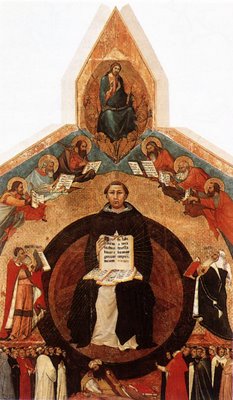On This Feast Day of St. Thomas Aquinas, Chief Among the Doctors of the Church

To the right is an old artistic portrayal known as "The Triumph of St. Thomas Aquinas." The image adorns the cover of a book I'm currently reading by Aidan Nichols, O.P. At the top is Christ and directly beneath him are the four evangelists, St. Paul (with the sword) and Moses. Plato and Aristotle are to his left and right. Popes, cardinals, and other influential individuals after his time are among the crowd beneath him, receiving the "light" from his writings. And, I think that is Averroes lying down beneath him with his own book turned face down. If you can see the beams of light, you'll appreciate the painting all the more. This particular saint's influence over the whole Church after his time cannot be overstated.
As he is remembered, celebrated, sought-out in prayers and intercessions, and (hopefully) read on this day above all other days of the year in which St. Thomas is celebrated, I thought it fitting to add a little entry here on one aspect of his thought often neglected.
There is a particular book on the liturgy that has been recommended to me by a close friend. In this book, entitled Theologia Prima, David Fagerberg explores aspects of the divine liturgy relevant to Catholics. One particularly interesting insight he raises is the fact that the liturgy is chief among all celebrations for a Catholic--it is the common, or "public" prayer of the one Church. This is in one sense, of course, unsurprising to anyone. Most other Christian communions would claim that their own worship services are paramount to them too. Perhaps, drawing from the strength in which Aidan Nichols phrases it (and Cardinal Ratzinger in his Spirit of the Liturgy, as well), one can state the case stronger. Nichols argues that, after the Sacred Scriptures, there is no one thing which more defines a Catholic than the divine liturgy of the mass. I think it instructive to see how, when certain Christian communions have downplayed the significance of the liturgy, the sacraments have either been equally downplayed or have disappeared altogether. But, a little more on this below.
Intimately connected with this idea of liturgy being crucial and most basic as to what a Catholic is and what he is regularly to do while here on Earth, are the sacraments. All of the sacraments are tied up with the liturgy. At times, the sacraments of healing (reconciliation & anointing of the sick) take place with reference to a future-oriented look at the liturgy. That is, in the former (reconciliation) one is placed back in a state of full grace and therefore able to participate fully in the mass, including the reception of the greatest of the sacraments--the Eucharist. The latter (anointing of the sick) is future-oriented with regard to either the heavenly banquet or becoming well again here on Earth, so that the Eucharist can be received again in a normal way (i.e., during the mass). Otherwise, all the other sacraments take place within the divine liturgy, hence showing their intimate connection with it.
So, why all of this on the liturgy and the sacraments on this feast day of St. Thomas Aquinas? One might be surprised to learn that St. Thomas had rather a good bit to say on the sacraments and their connection to the life of the Christian and to salvation, ultimately. And it seems to me that his comments make the most sense when one interprets them in the light of seeing that, for a Catholic, nothing is greater that the Eucharistic celebration in the whole realm of his faith. The Sacred Scriptures are paramount, but as they are qualitatively different from the worship celebration, and in fact the Scriptures are incorporated into the liturgy itself, one cannot pit them against each other. If one thinks in terms of Scriptures and Tradition together comprising the one 'divine wellspring' of the Faith, then the liturgy is seen as the most basic and greatest expression of that Sacred Tradition--more than Councils, Creeds, or Fathers.
I think that for the non-Catholic reader of St. Thomas Aquinas (and at times for the Catholic reader as well) it strikes one as strange for St. Thomas to say, which he does, that 'yes,' the sacraments are necessary for salvation. But, when the sacraments are seen as being part and parcel to the divine liturgy (or in some way intimately oriented toward it, as the sacraments of healing are), it seems to me that one might more easily stomach such a reply of St. Thomas Aquinas. (Also, of course, St. Thomas draws on other facets of the sacraments, in terms of their intrinsic nature, e.g., how they incorporate within themselves the duality intrinsic to man--his soul/body unity corresponds to the sacraments, which are simultaneously physical/spiritual, as well, so as to be oriented toward man's own nature).
Below I supply a link to some of his replies to sacramental questions from the Summa Theologica. I hope you enjoy. And I hope you, in whatever way your Christian tradition allows you to, commemorate and celebrate this great saint and doctor of the universal Western Church.
{Read the entire question, but play close attention to St. Thomas' own answer, which always follows the phrase "I answer that."}


0 Comments:
Post a Comment
<< Home